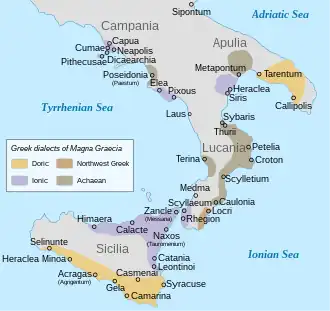Abron or Habron (Ancient Greek: Ἅβρων) was the name of a number of people in classical Greek history:
1. A son of the Attic orator Lycurgus.[1]
2. The son of Callias, of the deme of Bate in Attica, who wrote on the festivals and sacrifices of the Greeks.[2] He also wrote a work, περὶ παρωνύμων, which is frequently referred to by Stephanus of Byzantium (s.v. Ἀγάθη, Ἄργος, &c.) and other writers.
3. A Phrygian or Rhodian sophist and grammarian, pupil of Tryphon, and originally a slave (his parents were also slaves), who taught at Rome under the first Caesars. He was presumably the same Habron who was the author of the treatise On the Pronoun.[3]
4. A rich person at Argos, from whom the proverb Ἅβρωνος βίος ("The life of Abron"), which was applied to extravagant persons, is said to have been derived.[4]
References
Footnotes
Other sources
- Smith, William (1867), "Abron", in Smith, William (ed.), Dictionary of Greek and Roman Biography and Mythology, vol. 1, Boston, MA, p. 3, archived from the original on 2005-12-31, retrieved 2007-09-06
{{citation}}: CS1 maint: location missing publisher (link)
![]() This article incorporates text from a publication now in the public domain: Smith, William, ed. (1870). "Abron". Dictionary of Greek and Roman Biography and Mythology.
This article incorporates text from a publication now in the public domain: Smith, William, ed. (1870). "Abron". Dictionary of Greek and Roman Biography and Mythology.
